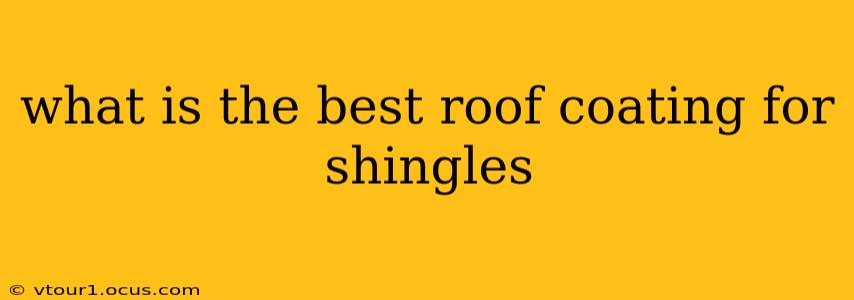Choosing the right roof coating for your shingles can significantly extend their lifespan and improve your home's energy efficiency. But with so many options on the market, finding the "best" one can feel overwhelming. This comprehensive guide will help you navigate the choices, considering various factors and answering common questions.
What are Roof Coatings and How Do They Work?
Roof coatings are liquid applied materials that form a protective layer over your existing shingles. They act as a sealant, preventing water damage, UV degradation, and temperature fluctuations. These coatings increase the roof's reflectivity, reducing heat absorption and lowering energy costs. They also add an extra layer of protection against harsh weather conditions like hail and wind.
Types of Roof Coatings for Shingles
Several types of roof coatings cater to different needs and budgets. The most common include:
-
Acrylic Coatings: These are water-based, environmentally friendly, and relatively inexpensive. They offer good protection against UV rays and are easy to apply. However, they may not be as durable as other options in extreme climates.
-
Silicone Coatings: Known for their superior elasticity and durability, silicone coatings can withstand significant temperature fluctuations and are excellent for resisting ponding water. They are more expensive than acrylic coatings but offer a longer lifespan.
-
Urethane Coatings: Urethane coatings provide exceptional waterproofing and protection against harsh weather. They're highly durable and resistant to chemicals, making them suitable for industrial applications as well as residential use. However, they tend to be pricier than acrylic or silicone coatings.
-
Aluminum Coatings: These highly reflective coatings are excellent for reducing heat absorption and lowering energy bills. Their reflective properties make them ideal for hot climates. However, they can be more expensive and require professional application.
What are the Benefits of Using a Roof Coating?
Applying a roof coating offers a multitude of advantages:
-
Extended Shingle Lifespan: A protective coating significantly prolongs the life of your existing shingles, delaying the need for a costly roof replacement.
-
Improved Energy Efficiency: Reflective coatings reduce heat absorption, lowering your cooling costs in the summer.
-
Enhanced Weather Protection: Coatings provide a barrier against water damage, UV rays, and harsh weather conditions.
-
Cost-Effective Solution: Coating your existing roof is generally less expensive than a complete roof replacement.
-
Improved Aesthetics: Some coatings can restore the appearance of aged or faded shingles.
What are the Different Application Methods?
Roof coatings can be applied using various methods, including:
-
Spray Application: This method ensures even coverage but requires specialized equipment and professional application.
-
Roller Application: This DIY-friendly method is suitable for smaller roofs but might not provide as uniform a coating as spraying.
-
Brush Application: This is the most labor-intensive method and suitable for smaller areas or detailed work.
How Long Does a Roof Coating Last?
The lifespan of a roof coating varies depending on the type of coating, application method, and climate conditions. Generally, you can expect a lifespan ranging from 5 to 20 years. Proper preparation and professional application can significantly extend the life of the coating.
How Much Does Roof Coating Cost?
The cost of roof coating depends on several factors including the size of your roof, the type of coating used, and labor costs. It's essential to get multiple quotes from reputable contractors to compare pricing.
Is it Better to Replace My Shingles or Use a Coating?
Whether to replace shingles or use a coating depends on the condition of your existing roof, your budget, and your long-term goals. If your shingles are severely damaged or nearing the end of their lifespan, replacement might be a better option. However, if your shingles are in relatively good condition, a coating can be a cost-effective way to extend their life and improve your home's energy efficiency.
What are Some Considerations Before Applying a Roof Coating?
Before applying a roof coating, consider these factors:
-
Roof Condition: The existing shingles must be in good condition with minimal damage.
-
Climate Conditions: Choose a coating suitable for your local climate.
-
Professional Application: For best results and warranty coverage, consider hiring a professional contractor.
-
Manufacturer's Instructions: Always follow the manufacturer's instructions carefully.
Choosing the best roof coating for your shingles requires careful consideration of various factors. By understanding the different types of coatings, their benefits, and application methods, you can make an informed decision that protects your investment and enhances your home's value. Remember to always consult with a qualified roofing professional to assess your roof's condition and determine the best solution for your needs.
